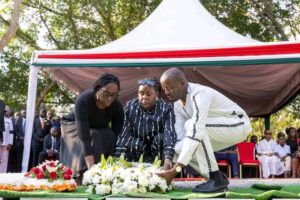By Burnett Munthali
Rosemary Odinga, the eldest daughter of the late former Prime Minister Raila Amolo Odinga, was long considered the one destined to carry on her father’s formidable political legacy.
Her father, fondly known as “Baba” by millions of Kenyans, had great hopes that she would follow in his footsteps and continue the Odinga family’s deep involvement in national leadership and reform.
This expectation became even more pronounced after the tragic passing of Raila’s firstborn son and political heir apparent, Fidel Odinga, in 2015.

Fidel’s death left a void not only in the Odinga family but also within the Orange Democratic Movement (ODM), where many had seen him as the natural successor to his father’s towering influence.
In the years that followed, all eyes turned to Rosemary as the next in line to uphold the Odinga political legacy.
Calm, composed, and remarkably intelligent, Rosemary embodied the grace and eloquence that made her both admired and respected in political and business circles.
Her decision to vie for the Kibra Parliamentary seat in 2017 was seen as a significant step — a practical initiation into the world of public service and a pathway toward national politics.
For her father, this move represented more than ambition; it was the nurturing of a legacy that had defined the Odinga family for over half a century.
However, Rosemary’s political journey was unexpectedly derailed when she fell seriously ill before the 2017 elections.
The illness, which affected her vision and mobility, forced her to withdraw from active politics and spend years undergoing treatment and rehabilitation both locally and abroad.
It was a heartbreaking turn for Raila Odinga, who had dreamed of witnessing his daughter rise through the ranks and eventually carry forward his lifelong struggle for democracy, justice, and equality.
Despite the setback, Rosemary’s resilience has remained admirable.
She has since refocused her energy on her businesses and on raising her two daughters, embracing a quieter yet purposeful life away from the political limelight.
Those close to her describe her as a woman of strength, intellect, and humility — qualities that made her stand out even during her brief foray into public life.
Many Kenyans still believe that, given her background, education, and charisma, Rosemary could one day re-enter the political arena and continue where her father left off.
For now, she appears content nurturing her entrepreneurial ventures and supporting community initiatives that empower women and youth.
Her calm demeanor, measured speech, and thoughtful approach to leadership have often drawn comparisons to her late father’s statesmanship.
Whether or not Rosemary Odinga eventually returns to politics remains to be seen, but her story is a powerful testament to endurance, family legacy, and the unpredictable turns of destiny.
As Kenya bids farewell to Raila Odinga, the question lingers quietly in the national consciousness — will Rosemary, the daughter he groomed, one day rise to fulfill her father’s unfulfilled dream?
Only time will tell.




